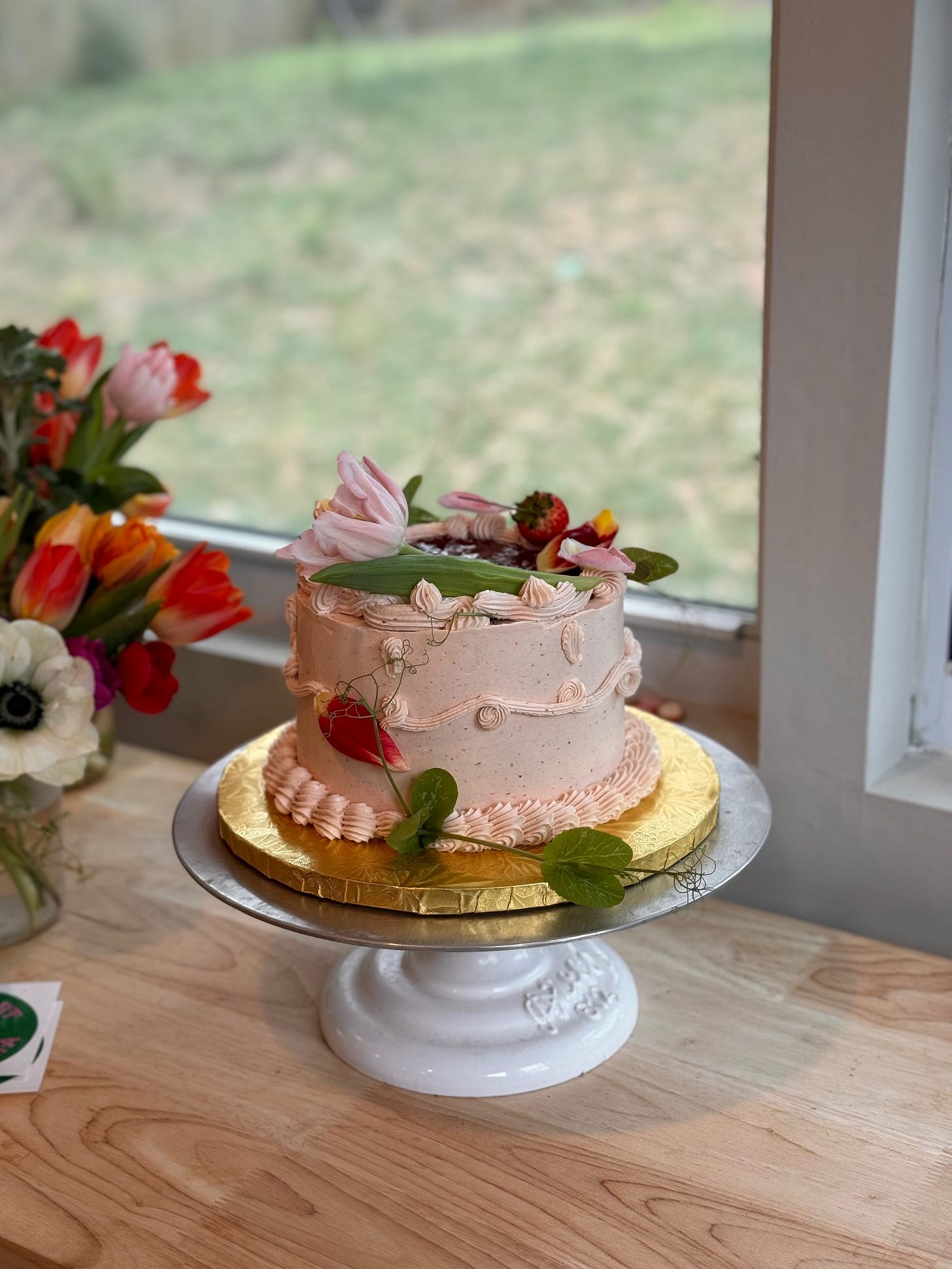Bakery Letter #5: Heart-Center
What it really means to me to be in the position to feed the public.
In addition to writing this Letter in the last week, I also mixed, baked, packaged and delivered close to 520 cookies for Little Tart Bakeshop’s annual Cookie Grab benefitting Planned Parenthood Southeast, which raised $52K. Because of this rather gargatuan task, I’ve switched up the usual Bakery Letter format this week due to sheer, utter exhaustion. Next week I’ll be back with a new recipe; later in April I’ll publish the second essay in my Internet Recipe Culture series. Thank you as always for reading.
Is there a larger role for the nontraditional bakery beyond a place where goods and services are exchanged in a community? The last few weeks this question has asked of me my increasing attention. It’s nearly all I can think about.
Since February I’ve had to cancel four cake orders due to non-payment, one of the more painful parts of this job. It doesn’t happen often, but the last month it’s been a repeat occurrence. Going back and forth with a potential customer discussing flavors, serving size, and pricing is just part of the adminstrative tasks I do each week. And sometimes I simply never hear back from people even when they’ve expressed great excitement over having a cake. At first this felt confounding but I’ve learned over the years it isn’t personal.
“If the bakery business is rooted in, and supported by, the local community, it will contribute to the health, skills, confidence and economic security of a much wider group than those directly involved.” - Bread Matters
But because I’ve had to cancel orders shortly after discussing cost, I’ve started to think about my pricing and what it really means to be in the position to feed the public. Depending on flavors and other customization, a 6 inch cake from me will cost someone between $65 and $90, not including the $40 I’ve been charging for what I call treat cakes, single layer cakes for when people just want a little treat. I make no money on treat cakes, but they remain on the menu because I like being a bit more accessible to people with this lower pricing. I believe my cakes are appropriately priced, but the question of is there a larger role for the nontraditional bakery still lingers. What true good am I bringing to my community in Decatur, Georgia if I’m only accessible to those who can budget for a fancy garden cake?
I want to be clear that I’m not making the assumption that someone ghosting me about a cake means they can’t afford it. My cake prices are listed right on my website underneath each cake, so pricing is never a surprise. I fully understand that things come up, and getting back to the baker on that cake you’re thinking about ordering is not a priority. If someone did want a cake from me and communicated that they didn’t have room for one in their budget, I would never think to turn them away. This would go very strongly against my belief that you help other people when they need it, even when it’s considered “bad business.” Money matters are often marred in shame and I never want to contribute to that (I have my own issues with money…don’t most of us).
Still, I have to charge what I do in order to support myself; I pay myself a true living wage here in Atlanta, but I’m not making bank and never will. (No baker does this work for the money.) The last month has just prompted me to really think about how I can use this bakery space and whatever social capital I’ve built in three years to work towards something deeper, and longer-lasting for Decatur, Atlanta, anyone near me who wants a garden cake.
The “Heart” in At Heart has always been intentional1. How can I turn living and working with heart2 into a business model, one that is above mere promotional tactic and is instead at the steady center of this bakery? Is it possible? I’m inspired by pay-what-you-can models and barter trades and am researching how to implement these at At Heart in a way that still lets me pay my bills. Brick and mortar bakeries have the advantage of being third spaces in a community, where people can meet and hang out over pastry and dessert. At Heart doesn’t have this privilege as a cottage bakery but if it is possible to create a larger role as a small, unorthodox bakery in my city, I think there’s a viable, heart-centered way forward.
Going back to medieval times, there was a common belief among both doctors and astrologers that certain body parts corresponded with an astrological sign. Everything from scheduling surgeries to starting a garden was planned according to whatever the moon was up to during a given time for best results. My sun sign Leo is believed to represent the heart, something I was thinking about when deciding what to name the bakery.
This caught my eye this week: In “The First Key: Your Sun” chapter of Chani Nicholas’ book You Were Born For This: Astrology For Radical Self-Acceptance, Nicholas writes in the section corresponding to the astrological house in which my sun sign is located: “One of the greatest challenges most of us face is finding ways to make an income that doesn’t cause greater harm to our world and ourselves. Capitalism flourishes when others and the earth are exploited. Understanding your identity through how you choose to engage, disrupt, or re-invent the exchange of labor and goods may be a central theme in your life.” (Emphasis my own for obvious reasons.)






Your cakes are worth every penny!!!
I loved reading this letter! I appreciate hearing the stories of other bakers. Especially cottage bakeries. Excited to read your next piece!